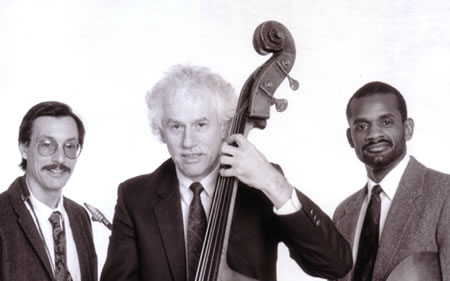
Chuck Metcalf with Dan Greenblatt and Jamal Nance
LARRY CORYELL:
Chuck, along with Jerome Gray and Overton, was a primary mentor for me back in 1964-65. Because of his encouragement, I was able to have a career that has surpassed all expectations. After I’d been in New York for about, oh, 7-8 months, Chuck sent me an unsigned letter–it was long, and interesting. But I didn’t realize it was he who wrote it until much later (I was stretching my mind out quite a bit then–a little delayed reaction).
It was a great letter.
Then we saw each other years later, when we both did the Village Gate; Chuck with Dexter and I doing solo.
Full circle.
JIM WILKE:
Chuck Metcalf was THE catalyst on the jazz scene when I arrived here in the early 60s. Chuck was playing lots of gigs with various groups, organizing sessions, and Chuck and Joni’s home in Madrona hosted the Sunday morning jams when the clubs had to close at Midnight Saturday nights because of Washington Blue Laws at the time. Great, wild sessions. Later, Chuck was one of the founders of the Seattle Jazz Society and actually leased the “castle” at Eastlake and Fuhrman to hold it for the Seattle Jazz Society. That became The Jazz Gallery in the 70s.
We had lots of talks and schemes to help keep jazz alive and vital at a time when jazz gigs were drying up. Without Chuck’s energy and ideas we would have had far fewer opportunities to hear and play jazz in that time… and by extension the Seattle jazz scene today. And what a pleasure to see him touring with Dexter Gordon…. man, that was exciting!
DAN GREENBLATT:
Chuck was a most generous spirit, certainly to me in a thousand ways, but I saw it all the time with others as well. He always went to everybody’s gigs, kept up with all the new cats in town, played sessions in his free time (not a lot of bass players, especially great ones, do this–think of how many times your sessions have died for lack of a bass player!), and in general was the kind of guy who maintained and created connections. A real community builder. And he supported all kinds of improvised music, including stuff that was controversial, cutting-edge, out of the box. He never sent out a dismissive or exclusionary vibe, except perhaps in the direction of the electric bass (“I don’t play guitar,” I heard him say once to somebody who asked him to “bring his electric” to a gig). He heard what musicians could do rather than what they couldn’t do.
Also a magnificent tune-writer. We did those two CD’s in the early 90’s (Elsie Street and Help is Coming), and between them there were about 20 originals, almost all gems. It’s unfortunate that his stuff never made it to fake books. I think his best work, especially Elsie Street, Forget Me Not, and Old Fashioned Love, among others, belongs in the same company with classics by Monk, Wayne, Joe, you name it. I still play these tunes, and they stand up next to anything and everything. If anyone wants charts, I’m happy to share them. His very last tune, with the foreboding title “Endgame,” needs to be played and heard.
… For me and a number of other musicians of my generation, Chuck was a beacon. That’s what I want to be like when I get to that age: lively, outgoing, fearless, open-hearted, creative. I saw him go through some very rough times but he never lost his spirit and his focus and his productivity. He was amazingly resiliant.
I am very thankful to have gotten a chance to know him, work with him, share musical space with him, help him in his times of need, and learn from him. Here in New York, at least in a very small circle, he will be mourned, celebrated, and missed.